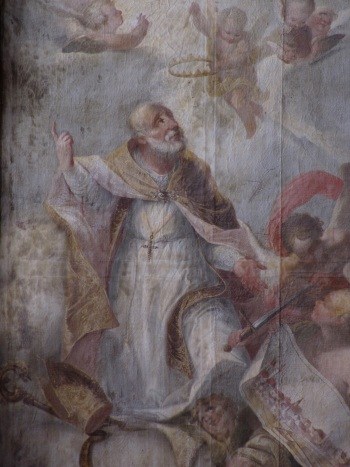 Of Saint Valentine few particulars are known. He was a holy priest of Rome, put to death about the year 270. One of the great Roman gates was built in his honor and called after him. It is now known as "del Popolo."
Of Saint Valentine few particulars are known. He was a holy priest of Rome, put to death about the year 270. One of the great Roman gates was built in his honor and called after him. It is now known as "del Popolo." Of Saint Valentine few particulars are known. He was a holy priest of Rome, put to death about the year 270. One of the great Roman gates was built in his honor and called after him. It is now known as "del Popolo."
Of Saint Valentine few particulars are known. He was a holy priest of Rome, put to death about the year 270. One of the great Roman gates was built in his honor and called after him. It is now known as "del Popolo."
But the name of Saint Valentine has come down to us associated with the remnant of a pagan custom, that of choosing for a year some person to whom honor should be paid. The casting of lots was held on the 15th of February, and with it began the Roman festival of Lupercalia, in honor of the god Pan and the goddess Jimo. To put down so dangerous a feast-making, the Church, according to Alban Butler, instituted the custom of drawing saints to be venerated for a year on the feast of Saint Valentine, the day preceding that of the pagan lot-drawing, thus substituting heavenly for earthly love.
This old, old custom of choosing some one to love, to be looked up to, sets one thinking. So widespread a custom, lasting, too, for so long a time through the pagan era, through the Middle Ages, even to our own day, seems to point to some natural cause. And it does. We are social beings in the natural and supernatural order, conscious of weakness and insufficiency when standing alone. In the garden of Paradise the foundation of society was laid when Adam said, "a man shall leave father and mother and cleave to his wife," showing that at no period of his life need he stand alone. The supernatural order is based upon the two great laws, "Thou shalt love the Lord thy God with thy whole heart, and thou shalt love thy neighbour as thyself." And there is such a stretching out of hands towards our fellow-creatures, such an expansion of heart at the sight of suffering or sorrow or need, that we have to be on our guard, lest it work in us merely from a natural goodness without the sacred stamp of grace.
This custom then of drawing saints to be our patrons for the year is a happy thought, bearing upon the inward yearning towards others; it is an expression of the loneliness of the human heart, its want of sympathy; it is also the bond between Heaven and earth. We are not made like the beasts with our eyes level with the ground, tending downwards. "We have a right to invade the unseen world, to choose helpers there, to count upon assistance and comfort and cheering, where there is so much consolation, help, and joy.
A certain number of patrons were chosen for us by our parents without our having a say in the matter. Others we ourselves chose at confirmation, but without any very distinct idea of what we were doing, perhaps. But our patron on Valentine's day can be one of mature deliberation, based upon a natural attraction and admiration, one whose example in the battle-field of life will be a help to us in our hour of trial. The more communion we can have with Heaven the better for us. The more our interests lie above, the less will the chains of earth rivet us to things below. And the chains of earth do bind. They bind in childhood and in youth; in middle manhood and old age. So the spirit that soars upward is the brave spirit, the safest, the happiest, and the strongest. There have been those who, in extreme old age, could show a long list of patrons whom they had honored for a year each with particular devotion, and when the allotted time was over added them to the long list of their predecessors, and invoked them still with the new Valentine of the New Year. What an array there would be of choice spirits to meet such as these when they came to their Heavenly reward.
To some of us who do not love multiplicity our own namesake may be our perpetual Valentine - the patron given to us at our baptism, or chosen at our confirmation, or at any other solemn occasion. Let these then become realities to us, living friends and helpers, substantial guardians. The Heavenly patron will never be wanting to his earthy client - of that we may be sure. Let us not be wanting to him. Saint Valentine, pray for us!
- taken from Light from the Altar, edited by Father James J McGovern, 1906